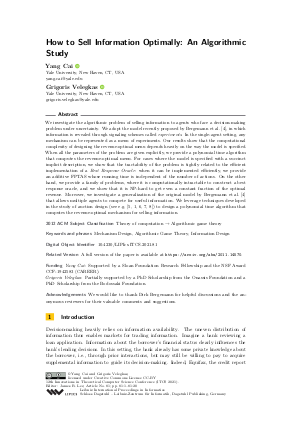@InProceedings{cai_et_al:LIPIcs.ITCS.2021.81,
author = {Cai, Yang and Velegkas, Grigoris},
title = {{How to Sell Information Optimally: An Algorithmic Study}},
booktitle = {12th Innovations in Theoretical Computer Science Conference (ITCS 2021)},
pages = {81:1--81:20},
series = {Leibniz International Proceedings in Informatics (LIPIcs)},
ISBN = {978-3-95977-177-1},
ISSN = {1868-8969},
year = {2021},
volume = {185},
editor = {Lee, James R.},
publisher = {Schloss Dagstuhl -- Leibniz-Zentrum f{\"u}r Informatik},
address = {Dagstuhl, Germany},
URL = {https://drops.dagstuhl.de/entities/document/10.4230/LIPIcs.ITCS.2021.81},
URN = {urn:nbn:de:0030-drops-136205},
doi = {10.4230/LIPIcs.ITCS.2021.81},
annote = {Keywords: Mechanism Design, Algorithmic Game Theory, Information Design}
}

 Creative Commons Attribution 3.0 Unported license
Creative Commons Attribution 3.0 Unported license





























